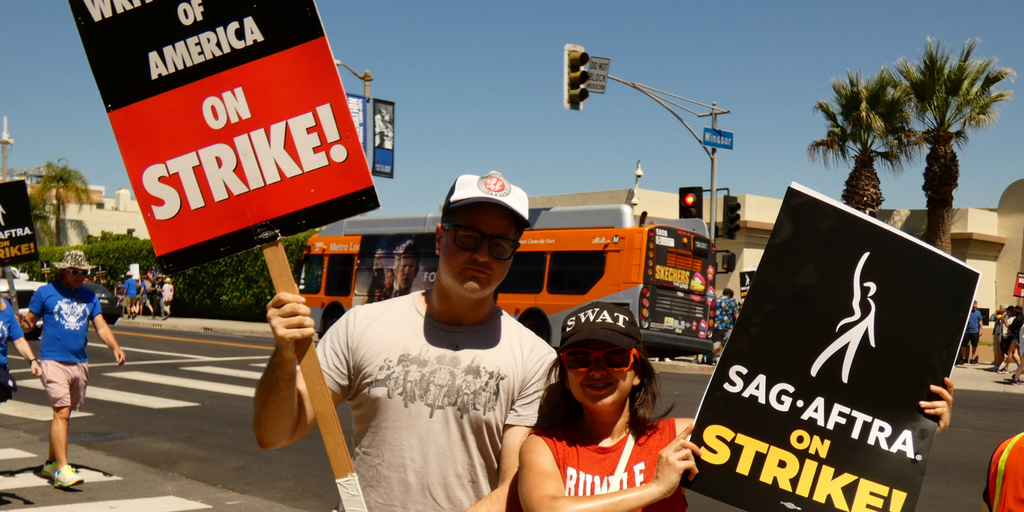Many voice actors are unhappy with SAG-AFTRA’s latest deal signed this week that allows one company, Replica Studios, to make AI-powered versions of union members’ voices with their respective consent.
The actors and performers union shared in a Tuesday post that the deal establishes rules around voice capture for Replica’s use, including requiring actor consent, compensation, and some control around future use.
But some talent, like prominent SAG-AFTRA voice actor Kellen Goff, best known for his work on the game series Five Nights at Freddy’s, responded to the news with the assertion that voice actors should leave SAG-AFTRA and create their own separate union, calling the union “useless” and “out of touch.”
“Voice actors need their own union to stand for what’s right,” said Troy Karedes, a voice actor and community lead at game studio Aesir Interactive. “I am appalled by this decision. Actors want to work and the threat of machine learning and AI taking away acting opportunities and autonomy sets a profoundly dangerous precedent.”
Many other voice actors are frustrated that SAG-AFTRA did not offer a vote for such a deal, while others assumed that very few voice actors were actually consulted prior to the deal’s closure.
“No actors are actively trying to monetize their AI replica,” said non-union voice actor and Bungie senior sound designer Pax Helgesen. “We don’t want it in the first place. We want to act. Which, if put to vote, you would have known already.”
“Nobody in our community approved this that I know of,” said SAG-AFTRA voice actor Steve Blum, who has voiced characters in shows like “Cowboy Bebop,” Wolverine in Marvel’s “Wolverine and the X-Men,” and video games like Mortal Kombat and God of War.
Veronica Taylor, who voiced Ash Ketchum and his mother in the first eight seasons of the Pokémon anime series, called SAG-AFTRA’s Replica deal a “slippery slope downward.”
“How has this agreement passed without notice or vote?” Taylor asked. “Why can’t the actual actor be used for the videogame? Every job brings a unique opportunity for an actor to act. Encouraging/allowing AI replacement is a slippery slope downward.”
Similarly, “Digimon” and “Akira” anime voice actor Joshua Seth called the deal “a big mistake.”
Numerous other actors expressed their frustration and disapproval of the deal and union leadership, with “Samurai Jack” voice actor Greg Baldwin calling the union “useless” and imploring SAG-AFTRA to “fuck off.”
“And here I thought the union was supposed to support and protect people, not feed them to the wolves,” said “Attack on Titan” and “Dragon Ball Super” voice actor Clifford Chapin.
“Such a slap in the face,” wrote Genshin Impact voice actor Daman Mills. “It’s genuinely appalling that SAG-AFTRA continues to preach unity amongst its members, continuously asks voice actors for their support, and continuously fail[s] to get us even the most basic of protections. Not an A-list celeb? Not a priority I suppose.”
I WILL NOT SIGN MY OWN FUCKING PINK SLIP!
You betrayed us.
Few regards,
A Voice Actor@sagaftra
— Greg Baldwin (@GregBaldwinIroh) January 10, 2024
Artificial intelligence remains a highly controversial topic in the entertainment and gaming industries. Tech and gaming companies have continued to adopt and sing the praises of AI, however. Xbox and NVIDIA, for example, have tried to frame generative AI as a tool that will help frustrated actors, writers, and game developers do their jobs better and faster. But many industry workers don’t believe that narrative, instead holding the substantiated fear that AI could end up taking or eliminating future jobs.
“I will not sign my own fucking pink slip,” wrote “Samurai Jack” and “Avatar: The Last Airbender” voice actor Greg Baldwin in a post to the union.
“You betrayed us,” Baldwin said.
Reached for comment, a SAG-AFTRA representative directed Decrypt to a note sent to union members, which includes an explanation of the deal and claims that an undisclosed number of SAG-AFTRA members were “deeply involved” in the deal’s negotiation.
Edited by Andrew Hayward
Editor’s note: This article was updated after publication to include response from SAG-AFTRA.














